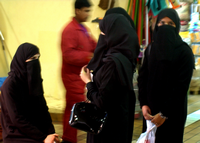As I made my way to Iraq in 2003 to cover the unfolding operation to overthrow Saddam Hussein, I spent many hours speaking to pro-democracy and women's rights activists in Kuwait. Back then, Kuwaiti activists held high hopes for positive change. Kuwaiti women had spent years fighting for the right to vote and run for office. If democracy came to Iraq, they assured me, it would give a push to their own agenda and bring them closer to success. Pro-democracy pioneer Lullwah al-Mullah told me, "Iraq is the country of Arab culture. It is the country of Islamic culture." A democratic Iraq with equality for women, she said, would lead the rest of the region in the same direction. As it happened, the road to democratic peace in Iraq took a painful detour. Still, even as Iraq struggled, Arab and Muslim women continued their determined efforts. Without question, they have a long way to go. But there are signs that those efforts are bearing fruit. The Arab world has the greatest democracy deficit on the planet. That alone works against the equality of women. A combination of religious and traditional customs also complicates the task of building equality. Millions of women in parts of the Arab and Muslim world still face some of the most restrictive and unequal conditions anywhere. But incremental progress is now undeniable.
World Citizen: Arab Women Progress on Rights, but There is Far to Go

